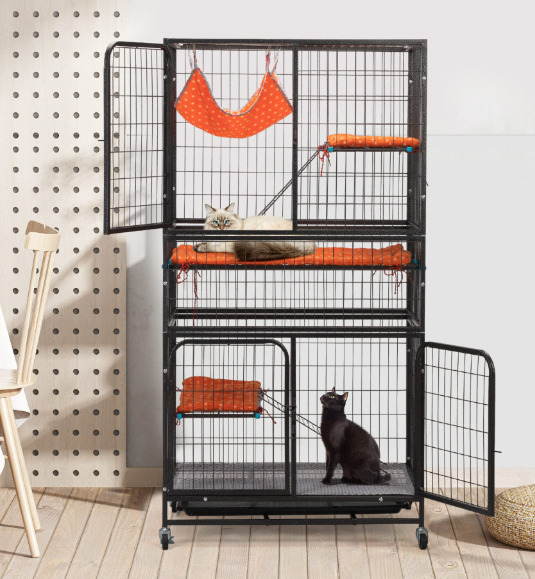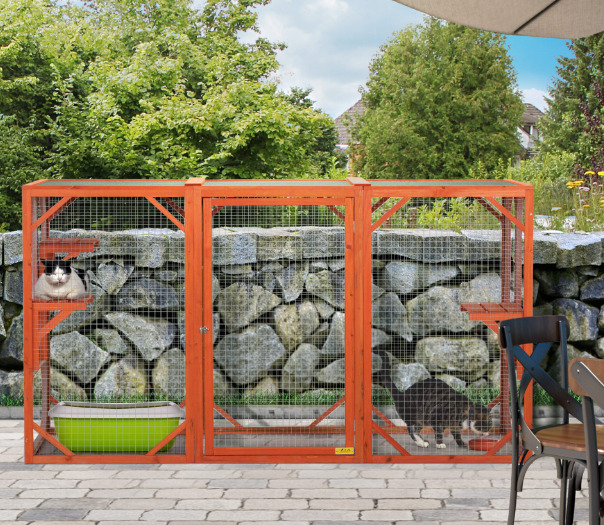In the perpetual debate of cats versus dogs, one intriguing question often arises: Do cats live longer than dogs? As pet lovers and enthusiasts explore the intricacies of feline and canine lifespans, the answer to this question remains elusive. In this comprehensive exploration, we delve into the factors that contribute to the longevity of our beloved pets in outdoor cat enclosure and attempt to demystify the age-old query.
Biological Factors and Genetics
Lifespan Disparities
The lifespan of cats and dogs varies significantly, with numerous factors influencing the longevity of each species. On average, cats in outdoor cat enclosure tend to live longer than dogs. According to veterinary studies, the typical lifespan of a cat ranges from 12 to 16 years, whereas dogs generally live between 10 to 13 years. However, these are broad averages, and several nuances must be considered to grasp the complete picture.
Genetics and Breed Variations
Genetics play a crucial role in determining the lifespan of both cats in outdoor cat enclosure and dogs. Different breeds within each species exhibit distinct characteristics and susceptibility to certain health conditions. For instance, smaller dog breeds often outlive their larger counterparts, while certain cat breeds, such as the Siamese or Ragdoll, are known for their longevity. Exploring the genetic intricacies provides valuable insights into the factors influencing the duration of our furry companions’ lives.
Environmental and Lifestyle Influences in Outdoor Cat Enclosure
Environmental and Lifestyle Factors
Beyond genetics, environmental and lifestyle factors contribute significantly to the lifespan of cats and dogs. Cats in outdoor cat enclosure, being more independent and territorial, might face fewer risks associated with outdoor activities, leading to a potentially longer life. On the other hand, dogs, especially those with adventurous spirits, might encounter more hazards. Urban environments, traffic exposure, and dietary habits all play pivotal roles in shaping the lifespan of our pets.
Socialization and Exercise
The importance of socialization and exercise cannot be overstated when considering the lifespan of pets. Dogs, being social animals, benefit greatly from regular interaction with other dogs and humans. Adequate exercise is vital for their physical and mental well-being. Cats in catio, while more independent, still require mental stimulation and play. Enriching their environment with toys, climbing structures, and interactive play can contribute to a healthier and more active lifestyle, positively impacting their longevity.

Healthcare and Preventive Measures in Outdoor Cat Enclosure
Veterinary Care and Health Maintenance
Regular veterinary care and health maintenance are paramount in ensuring the well-being and longevity of both cats and dogs. Cats in catio, often perceived as more self-sufficient, may require less intervention. However, preventive healthcare, timely vaccinations, and a balanced diet contribute to the overall health of both species. By understanding the specific healthcare needs of cats and dogs, pet owners can actively contribute to extending their furry friends’ lifespans.
Common Health Issues
As cats and dogs age, they are prone to various health issues that can affect their overall lifespan. Cats in catio commonly face kidney disease, hyperthyroidism, and dental problems, while dogs may grapple with arthritis, heart conditions, and obesity. Recognizing the signs of aging and addressing health concerns promptly through proper veterinary care can significantly impact the quality and duration of their lives.
Nutrition and Diet in Outdoor Cat Enclosure
The Role of Diet in Longevity
Dietary habits play a pivotal role in determining the lifespan of both cats and dogs. Cats in catio, as obligate carnivores, require a diet rich in animal proteins and fats. In contrast, dogs, being omnivores, benefit from a more varied diet that includes meat, vegetables, and grains. The quality and appropriateness of the diet are crucial factors. Addressing individual nutritional needs based on species, breed, and age can significantly impact the overall health and lifespan of our furry companions.
Advances in Veterinary Medicine
Advancements in veterinary medicine continue to extend the lifespans of both cats and dogs. From innovative treatments for chronic conditions to breakthroughs in surgical procedures, the accessibility of quality veterinary care has a direct impact on the longevity of our pets. Regular check-ups, preventive screenings, and prompt medical intervention in catio can mitigate health risks and contribute to an extended and healthier life for both cats and dogs.

Emotional Well-being and Responsible Ownership
Human-Animal Bond and Stress Levels
The emotional well-being of pets is closely tied to their lifespan. Cats in outdoor cat enclosure, known for their independent nature, might thrive in quieter environments, while dogs often thrive on social interaction and physical activity. The strength of the human-animal bond also plays a role, with studies suggesting that pets experiencing stress or anxiety may be more susceptible to health issues. Providing a supportive and loving environment can positively influence the mental and emotional health of both cats and dogs, contributing to a longer and more fulfilling life.
Responsible Breeding Practices
The role of responsible breeding practices in catio cannot be ignored in the discussion of pet longevity. Unscrupulous breeding can lead to genetic predispositions to certain diseases and health issues. Ethical breeders prioritize the health and well-being of the animals, conducting thorough health screenings and avoiding practices that may compromise the long-term health of the pets. By supporting responsible breeding, pet owners contribute to the overall well-being and longevity of cats and dogs.
In the ongoing debate over whether cats live longer than dogs, it is crucial to recognize the multifaceted nature of this question. While statistical averages suggest that cats in outdoor cat enclosure generally enjoy a longer lifespan, numerous factors contribute to the individual experiences of both species. From genetics and breed variations to environmental factors and healthcare, each element plays a role in shaping the life expectancy of our cherished companions.